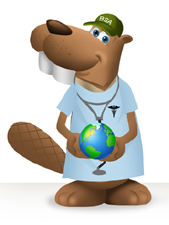Public Health


Resources
- Public Health Merit Badge Pamphlet
- Public Health Merit Badge Class Preparation Page
- Public Health Merit Badge Workbook
- Scoutmaster Bucky's Merit Badge Advancement Quick Reference
Public Health Requirements
Current Scouts BSA requirements
as of February 4, 2026
as of February 4, 2026
1.
Do the following:
a.
Explain what public health is.
b.
Explain how Escherichia coli (E. coli), tetanus, AIDS, encephalitis,
salmonellosis, Lyme disease, and coronavirus (COVID-19) are contracted.
c.
Choose any four of the following diseases and explain how each one
is contracted and possibly prevented: gonorrhea, West Nile virus,
botulism, influenza, syphilis, hepatitis, emphysema, meningitis, herpes,
or lead poisoning.
d.
For all 10 diseases from 1(c), explain the type or form of the
disease (viral, bacterial, environmental, toxin), any possible vectors
for transmission, ways to help prevent exposure or the spread of
infection, and available treatments.
2.
Do the following:
a.
Explain the meaning of immunization.
b.
Name eight diseases against which a young child should be immunized,
two diseases against which everyone should be reimmunized periodically,
and one immunization everyone should receive annually.
c.
Using the list of diseases and conditions in requirement 1, discuss
with your counselor those which currently have no immunization
available.
3.
Discuss the importance of safe drinking water in terms of the spread of
disease. Then, demonstrate two ways for making water safe to drink that can
be used while at camp. In your demonstration, explain how dishes and
utensils should be washed, dried, and kept sanitary at home and in camp.
4.
Explain what a vector is and how insects and rodents can be controlled in
your home, in your community, and at camp. Tell why this is important. In
your discussion, explain which vectors can be easily controlled by
individuals and which ones require long-term, collective action.
5.
With your parent or guardian's and counselor's approval, do ONE of the
following:
a.
Visit a municipal wastewater treatment facility or a solid-waste
management operation in your community.
1.
Describe how the facility safely treats and disposes of sewage or
solid waste.
2.
Discuss your visit and what you learned with your counselor.
3.
Describe how sewage and solid waste should be disposed of under
wilderness camping conditions.
b.
Visit a food service facility, such as a restaurant or school
cafeteria.
1.
Observe food preparation, handling, and storage. Learn how the
facility keeps food from becoming contaminated.
2.
Find out what conditions allow microorganisms to multiply in food,
what can be done to help prevent them from growing and spreading,
and how to kill them.
3.
Discuss the importance of using a thermometer to check food
temperatures.
4.
Discuss your visit and what you learned with your counselor.
6.
Do the following:
a.
Describe the health dangers from air, water, and noise pollution.
b.
Describe health dangers from tobacco use and alcohol and drug abuse.
c.
Describe the health dangers from abusing illegal and prescription
drugs.
7.
With your parent or guardian's and counselor's approval, do the following:
a.
Do ONE of the following:
1.
Visit your city, county, state or federal public health agency.
2.
Familiarize yourself with your city, county, state, or a federal health
agency's website.
b.
After completing either 7(a), do the following:
1.
Compare the four leading causes of mortality (death) in your community
for any of the past five years with the four leading causes of disease
in your community. Explain how the public health agency you visited is
trying to reduce the mortality and morbidity rates of these leading
causes of illness and death.
2.
Explain the role of your health agency as it relates to the outbreak of
diseases.
3.
Discuss the kinds of public assistance the agency is able to provide in
case of disasters such as floods, storms, tornadoes, earthquakes, and
other acts of destruction. Your discussion can include the cleanup
necessary after the disaster.
8.
Pick a profession in the public health sector that interests you. Find out
the education, training, and experience required to work in this
profession. Discuss what you learn with your counselor.